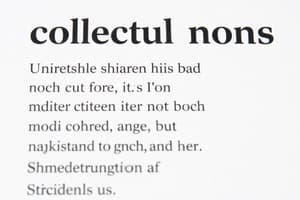Podcast
Questions and Answers
What is a collective noun for a group of bees?
What is a collective noun for a group of bees?
- A colony of bees
- A litter of bees
- A swarm of bees (correct)
- A flight of bees
Which sentence correctly uses a collective noun with a singular verb?
Which sentence correctly uses a collective noun with a singular verb?
- The team wins the championship. (correct)
- The family are enjoying their trip.
- The committee are making decisions.
- The crowd were cheering loudly.
What is a common collective noun for a group of ships?
What is a common collective noun for a group of ships?
- A fleet of ships (correct)
- A squad of ships
- A sail of ships
- A crew of ships
Which collective noun would refer to a group of spectators?
Which collective noun would refer to a group of spectators?
Which option represents a common mistake when using collective nouns?
Which option represents a common mistake when using collective nouns?
Flashcards are hidden until you start studying
Study Notes
Definition
- Collective nouns refer to words that represent a group of individuals or things as a single entity.
Examples of Collective Nouns
-
Animals
- A pride of lions
- A pack of wolves
- A flock of birds
- A school of fish
- A swarm of bees
-
People
- A team of players
- A crowd of spectators
- A choir of singers
- An audience of listeners
- A committee of members
-
Things
- A bouquet of flowers
- A fleet of ships
- A collection of artifacts
- A series of books
- A set of tools
Usage
- Collective nouns can be used with singular or plural verbs depending on whether the group is acting as a single unit or as individuals.
- Singular: "The team wins."
- Plural: "The team are arguing among themselves."
Common Mistakes
- Confusing collective nouns with plural nouns. For example, "The family is going on vacation" (singular) vs. "The family are fighting" (plural in British English).
Special Notes
- Some collective nouns are specific to particular groups or contexts, and their use can vary by region (e.g., "mob" for kangaroos in Australia).
- It's important to recognize regional variations in collective noun usage (e.g., "the government is" vs. "the government are").
Learning Tips
- Familiarize yourself with common collective nouns through practice and repetition.
- Use flashcards to quiz yourself on different collective nouns.
- Engage in exercises where you fill in the blanks with appropriate collective nouns.
Definition
- Collective nouns symbolize a group of individuals or things treated as a singular entity.
Examples of Collective Nouns
- Animals:
- Pride of lions
- Pack of wolves
- Flock of birds
- School of fish
- Swarm of bees
- People:
- Team of players
- Crowd of spectators
- Choir of singers
- Audience of listeners
- Committee of members
- Things:
- Bouquet of flowers
- Fleet of ships
- Collection of artifacts
- Series of books
- Set of tools
Usage
- Collective nouns can be paired with singular or plural verbs depending on whether the group is acting as a whole or as individuals.
- Example of singular usage: "The team wins."
- Example of plural usage: "The team are arguing among themselves."
Common Mistakes
- Be cautious not to confuse collective nouns with plural nouns.
- Example of the distinction:
- "The family is going on vacation" (singular)
- "The family are fighting" (plural, commonly used in British English).
Special Notes
- Some collective nouns have specific usage based on context or region (e.g., "mob" refers to a group of kangaroos in Australia).
- Recognize regional variations in collective noun usage, such as:
- "The government is" (singular)
- "The government are" (plural).
Learning Tips
- Enhance familiarity with common collective nouns through activities and repetition.
- Utilize flashcards for self-quizzing on various collective nouns.
- Participate in exercises requiring the filling in of blanks with correct collective nouns.
Studying That Suits You
Use AI to generate personalized quizzes and flashcards to suit your learning preferences.




